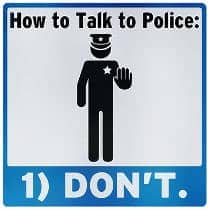

Helping someone you know has committed a felony either to avoid or escape authorities makes you criminally liable as an Accessory After the Fact.
This crime is known as a wobbler, meaning it can be charged with accessory after the fact as a felony or a misdemeanor. Many factors may contribute to a prosecutor electing to charge the accessory after the fact crime as a felony, as opposed to a misdemeanor. For example, prosecutors take into consideration how egregious the crime was. Hiding someone in your home that has committed murder and lying to the police about your contact with that person and his or her whereabouts will most certainly be a felony. The acts you took to help the felon will also be factored into the prosecutor’s decision. Finally, they consider your criminal history, as well. If you have a long criminal record, the chances increase that you will be charged with accessory after the fact as a felony, rather than a misdemeanor.
Felony accessory after the fact punishments include a year and a half in prison, in addition to a $5,000 fine. For misdemeanors, the punishment may be a year in prison, in addition to the same fine.
Being an accessory is less serious than helping someone plan or commit a felony but it is serious nonetheless. Examples of being an accessory to a crime include lying to the police, providing false alibis, harboring the felon in your home, letting them borrow your car to escape, hiding the stolen goods, and many other acts.
This crime is also to be distinguished from other similar crimes, such as obstruction of justice and aiding and abetting. Obstructing justice is one that involves a misdemeanor, rather than a felony. So, for helping a friend escape punishment for a misdemeanor, you cannot be charged with being an accessory after the fact. Likewise, aiding and abetting is the assisting of another in planning or committing the crime, as described above. Aiding and abetting can result in your being charged for the actual accessory after the fact crime itself, as well.
Penalties for committing this crime may include:
The prosecutor must prove:
Aiding includes lying, driving a getaway car, destroying evidence, or misleading authorities.
Each of the above elements must be proven beyond any reasonable doubt for you to be convicted of this crime. There must be a unity of action and intention in order to be convicted. This means you must have intended to aid the felon in escaping punishment, and you also must have done something to further that goal.
criminal defense attorney. Your attorney may claim you acted under duress, such that you only aided the felon because you were trying to avoid immediate harm.
Your attorney may also be able to show you did not know you were providing aid, or that you did know the person you were aiding had committed a felony.

If you or a loved one is being charged with being an Accessory After the Fact in violation of PC 32 in California, we invite you to contact us immediately for a free case review. Schedule an appointment to meet with us in person, or feel free to submit an evaluation online and we will get in contact with you ASAP.
Our experienced and assiduous Criminal Defense Lawyers will be sure to fight until the end to reduce or drop your charges completely.
Call LAW MART for a FREE Case Review: 310-894-6440

Copyright © 2024 law – Powered by AmelCS